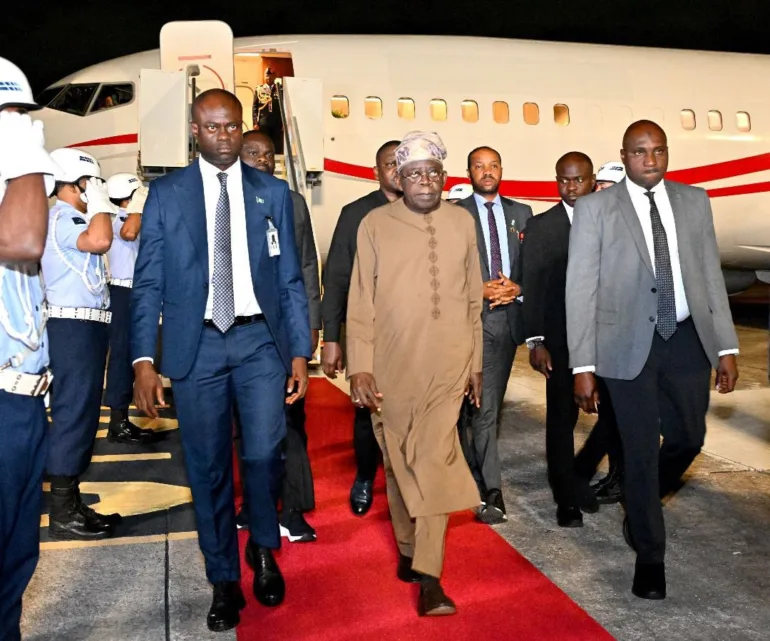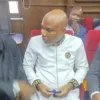President Bola Tinubu has arrived in Rio de Janeiro, Brazil, ahead of the 17th BRICS Summit.
His aircraft landed at Galeão Air Force Base at 8:45 p.m. on Friday, where he was welcomed by the base commander, Brazil’s Deputy Minister for Africa and the Middle East, Ambassador Carlos Sergio Sobral Duarte, and the Deputy Minister for Trade Promotion, Science, Technology, Innovation, and Culture.
Tinubu is attending the summit at the invitation of Brazilian President Luiz Inácio Lula da Silva, following Nigeria’s recent elevation to “partner country” status within BRICS—a step up from its long-held observer role.
Nigeria was officially admitted as the ninth BRICS partner country in January 2025, under a new category introduced at the 16th BRICS Summit in October 2024. As a partner, Nigeria now has access to BRICS meetings, summits, and collaborative initiatives, allowing it to contribute to discussions and help shape official documents, even though it is not yet a full member.
The BRICS acronym originally referred to Brazil, Russia, India, China, and South Africa—an informal coalition of major emerging economies. In 2024, the group expanded to include six additional countries: Egypt, Ethiopia, the United Arab Emirates, Iran, Saudi Arabia, and Indonesia.
This year’s summit, taking place from July 6–7, focuses on key global issues including reforms to global governance and enhanced cooperation among the Global South.
BRICS leaders expected to challenge U.S. trade policies
As the summit opens, BRICS leaders are preparing to push back against former U.S. President Donald Trump’s hardline trade policies. Despite representing nearly half the world’s population and 40% of global economic output, BRICS nations remain divided over how to address conflicts in the Middle East.
According to insiders involved in the negotiations, summit participants are drafting a joint statement criticizing the economic uncertainty created by U.S. tariff hikes—though any final declaration is unlikely to mention the United States or Trump by name.
Since returning to office in January, Trump has escalated trade tensions globally, threatening both allies and rivals with sweeping new tariffs. On Friday, letters were reportedly dispatched to trading partners, notifying them of increased tariff rates expected to take effect on July 9.
Marta Fernandez, director of the BRICS Policy Center at the Pontifical Catholic University of Rio de Janeiro, explained:
“We expect a cautious tone at this summit. It’s unlikely the U.S. will be mentioned explicitly, especially given China’s recent trade negotiations with Washington. This isn’t the moment to provoke further friction.”
Notable Absences: Xi and Putin to miss summit in person
This year’s summit will lose some of its political weight due to the absence of Chinese President Xi Jinping, who is skipping the meeting for the first time in 12 years. Analysts suggest his absence may be due to several factors, including a recent visit by President Lula to Beijing and the presence of Indian Prime Minister Narendra Modi, who is expected to receive high-profile honors in Brazil.
Ryan Hass, a former China director at the U.S. National Security Council, commented:
“Xi may be avoiding a scenario where he appears upstaged by Modi. Delegating attendance to Premier Li Qiang likely reflects multiple considerations.”
Russian President Vladimir Putin, facing an international arrest warrant, will also not attend in person. The Kremlin has confirmed he will join via video link.
Middle East conflicts divide BRICS bloc
Iranian President Masoud Pezeshkian will also skip the summit, following recent hostilities with Israel. Diplomats say the BRICS nations remain divided on how to respond to ongoing crises in Gaza and the broader Middle East.
Iran is pushing for a stronger collective stance—beyond calls for a two-state solution and peaceful conflict resolution—but consensus remains elusive.
Beyond geopolitics, the summit will also focus on pressing global challenges, including artificial intelligence, healthcare innovation, and climate change.
With its recent expansion, BRICS now includes 11 nations—Brazil, Russia, India, China, South Africa, Saudi Arabia, Iran, the UAE, Egypt, Ethiopia, and Indonesia—positioning itself as a formidable counterweight to Western-dominated institutions. However, the group’s growing diversity has introduced new internal divisions.
Despite these challenges, Brazil is determined to foster unity at the summit. Foreign Minister Mauro Vieira said: “BRICS has historically spoken with one voice on major global issues. There’s no reason we can’t do the same now, even on sensitive topics like the Middle East.”
This summit is part of a major diplomatic year for Brazil, which will also host the G20 summit and COP30 climate talks before entering a crucial presidential election cycle in 2026, where President Lula is expected to seek re-election.


